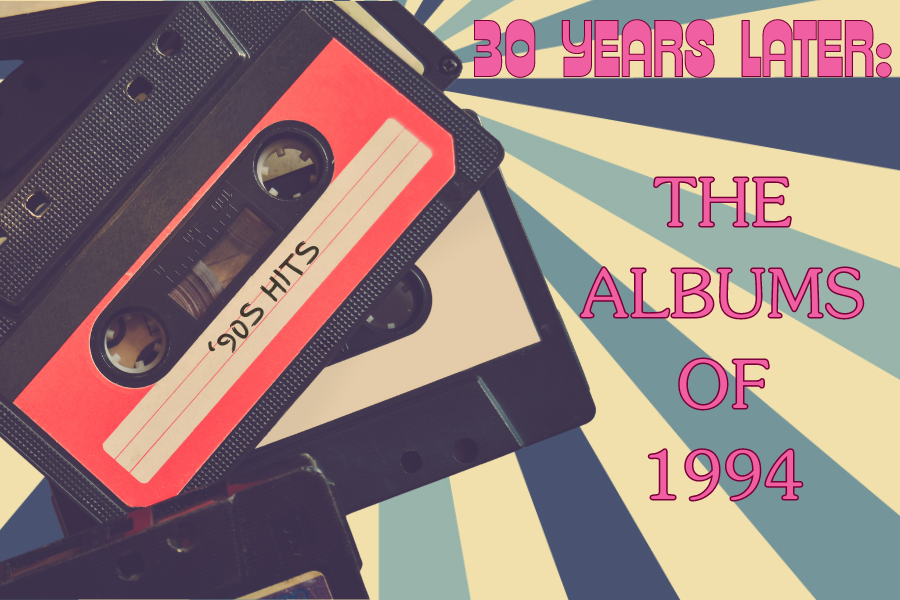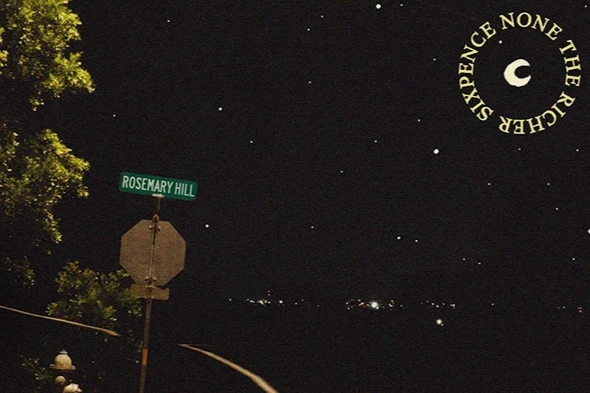The music industry was forever altered in 1994 by a series of groundbreaking albums that emerged from various genres. It was a year marked by artistic innovation and genre-defining releases. From the gritty anthems of grunge to the introspective verses of hip-hop, artists pushed boundaries and left an undeniable mark on the music industry. 1994 was a pivotal year that witnessed the rise of new voices and the solidification of established artists. The albums released during this time were not just collections of songs; they were cultural milestones that reflected the complexities in the world around us.

“Dookie” – Green Day
Genre: Punk/Rock
Release date: Feb. 1
Before the eyeliner, red ties and concept albums, Green Day released ÔÇťDookie,ÔÇŁ which would change the sound and look of punk music. The album was Green DayÔÇÖs first major label record which for decades left the band excommunicated from punk culture, as the genre was supposed to be independent, not mainstream. Regardless of punk expectations, Green DayÔÇÖs catchy guitar riffs, cynical lyrics and vulnerability on ÔÇťDookieÔÇŁ inspired the next generation of rock bands. At a time when singers like Axl Rose of Guns N’ Roses ┬áand Layne Stayley of Alice in Chains ┬áset the standard for having towering vocals and a wide vocal range, lead singer Billie Joe Armstrong ignored the benchmark and became famous for his drug-induced nasal voice, which would instantly become recognizable on ÔÇťLongviewÔÇŁ and ÔÇťBasket Case.ÔÇŁ Even though ÔÇťLongviewÔÇŁ was the first single off of ÔÇťDookie,ÔÇŁ it was ÔÇťBasket CaseÔÇŁ that made Green Day as big as the Backstreet Boys in the ÔÇś90s. With Tr├ę CoolÔÇÖs irreplaceable drumming pattern, bassist Mike Dirnt’s aptitude and ArmstrongÔÇÖs self-aware lyrics, it makes sense that ÔÇťBasket CaseÔÇŁ is the most popular song from ÔÇťDookie.ÔÇŁ Despite ÔÇťBasket CaseÔÇŁ being the hit from ÔÇťDookie,ÔÇŁ the underrated gems on the album are ÔÇťComing Clean,ÔÇŁ ÔÇťWelcome To ParadiseÔÇŁ and ÔÇťBurnout. Green Day didnÔÇÖt take themselves too seriously when making ÔÇťDookie,ÔÇŁ but the bandÔÇÖs talent and impressive fluidity with each other were apparent and unrepeatable.┬á

“Superunknown” – Soundgarden
Genre: Grunge/Rock
Release date: March 8 
Even though Soundgarden was the first grunge band to sprout, they were the last to bloom; as they were starting their rise to fame, the genre was fading out. To put it into perspective, Soundgarden’s ÔÇťSuperunknownÔÇŁ entered the music charts a month before Nirvana singer Kurt CobainÔÇÖs death. ÔÇťSuperunknownÔÇŁ was made while the band was processing the death of their best friend Andrew Wood, who led early grunge band Mother Love Bone, but sadly passed away from an overdose before the band could grasp onto a large audience. Since grunge had begun to fizzle out, audiences shifted their attention towards more upbeat sounds that were fronted by Green Day and The Offspring. This caused ÔÇťSuperunknownÔÇŁ to be more overlooked than it deserved to be. With songs like ÔÇťFell On Black Days,ÔÇŁ ÔÇťMailmanÔÇŁ and ÔÇť4th of JulyÔÇŁ on the album, it was obvious Soundgarden had talent that people had never seen before. For years, grunge had dominated the music scene, so it makes sense that people were tired of seeing the same chord progressions and the same sad stories told over and over again by the same raspy voices. Though Cornell didnÔÇÖt have the expected outgoing stage presence the other grunge singers had, his flawless, nearly four-octave range set him apart from the other icons. Listening to ÔÇťSuperunknownÔÇŁ now is more upsetting than anything, as Cornell passed away from suicide in 2017 after having a long history of drug addiction and depression. Listeners glossed over the frontman’s cryptic lyrics since the music was catchy, and his voice was impressively engaging. CornellÔÇÖs influence and late impact are captured with the lyric, ÔÇťNo one sings like you anymore,ÔÇŁ off of the band’s psychedelic hit: ÔÇťBlack Hole Sun.ÔÇŁ

“Live Through This” – Hole
Genre: Grunge/Rock
Release date: April 12
Released only four days after Cobain’s death, ÔÇťLive Through ThisÔÇŁ walked the same road NirvanaÔÇÖs ÔÇťNevermindÔÇŁ and ÔÇťIn UteroÔÇŁ did with rage and golden hooks, but only HoleÔÇÖs job was harder. The band had to sell the alternative sound through a female lens, which as history shows, nobody is interested in. ÔÇťLive Through ThisÔÇŁ was antagonistic frontwoman Courtney LoveÔÇÖs way of touching base on some of her past traumas, but for most of the album, the listener has to deal with the singer’s troubled victim complex. ÔÇťLive Through ThisÔÇŁ is one of the staple pieces in the riot girl subgenre, and for many, the album helped form the ÔÇťfemale rageÔÇŁ sound, but for others, the album capitalizes madness. The opening song ÔÇťVioletÔÇŁ welcomes the listener into LoveÔÇÖs world, which is filled with rage, envy and bitterness. The song perfectly fits as the opener as it carries quiet verses to furious choruses, perfectly embodying LoveÔÇÖs sound of switching from the victim to the aggressor. Due to LoveÔÇÖs outgoing and problematic personality, a lot of HoleÔÇÖs work does not get the recognition it deserves. LoveÔÇÖs writing style is very similar to Cobain and Billy Corgan’s of Smashing Pumpkins, but only her lyrics go unnoticed. In the song ÔÇťDoll PartsÔÇŁ Love wrote, ÔÇťI love him so much, it just turns to hate. Someday you will ache like I ache,ÔÇŁ which is a line that undoubtedly would be seen quoted on an edgy Pinterest board ÔÇô if anyone but Love wrote it.

“Illmatic” – Nas
Genre: Rap 
Release date: April 19
In the ÔÇś90s, for years it seemed like the only two rappers that were talked about were 2Pac and The Notorious B.I.G. Yet, rapper Nas made his way into the rap world with his own inventive sound, gritty voice and unapologetic writing. Nas began writing his debut album, ÔÇťIllmatic,ÔÇŁ when he was just 17, and the record later came out when he was 23. As a young adult, most people are trying to figure out who they are and what they want to pursue, but Nas knew who he was and what he wanted to use his voice for at his young age. Similar to 2Pac, Nas specialized in his writing. Nas perfected storytelling with wordplay and emotion, helping his music reach a larger audience. Nas proved he could do more than just write on the song ÔÇťN.Y. State of Mind,ÔÇŁ where he raps on a complex beat that is centered around simple notes. NasÔÇÖ storytelling and tone helped make the rapper’s debut add a new flavor to the New York rap scene.

“Weezer” – Weezer
Genre: Rock 
Release date: May 10
Glam, punk, soft and heavy metal are all subgenres of the rock genre, and for decades it felt like alternative bands could only fall into those categories. Yet, it was the California-based band Weezer that broke genre expectations and introduced the sound of nerd rock. Singer and guitarist River CuomoÔÇÖs lyrics made it come off that the band lacked communication skills as he started the song ÔÇťBuddy HollyÔÇŁ off with the line, ÔÇťWhatÔÇÖs with these homies dissing my girl?ÔÇŁ One would think that for a rock band, that lyric would drive listeners away, but Weezer mixed dorky lyrics with music inspired by Iron Maiden, KISS and Buzzcocks, which, surprisingly, helped the band gain a huge following. No matter how unserious the lyrics to ÔÇťSay It AinÔÇÖt SoÔÇŁ are, it is undeniably a phenomenal song, one thatÔÇÖs almost impossible not to play air guitar to. For a band that has been around for 30 years, Weezer is one of the only groups that hasnÔÇÖt changed their sound or image. After three decades, the vibe of living in their mom’s basement is still evident, and fans are loving it.┬á

“Ill Communication” – Beastie Boys
Genre: Hip-hop/Rap/Rock
Release date: May 31
In the ÔÇś80s, the Beastie Boys were ridiculed for their misogynistic lyrics and ÔÇťfrat boyÔÇŁ image. Yet, their fourth album, ÔÇťIll Communication,ÔÇŁ challenged critics because of its uncharacteristically mature themes. Beastie Boys was one of the first bands to cross the boundaries of mixing punk and hip-hop, and the rap group shocked audiences after they included jazz in ÔÇťIll Communication.ÔÇŁ The album is overall infused with jazz but still includes the same bratty punk beats and tongue-in-cheek lyrics that made the group famous. Oftentimes, fans forget that the Beastie Boys were rooted in the punk scene and grew up seeing the Ramones and Minor Threat ÔÇö┬á two leading inspirations in the alternative scene. The rap group returned to their original hardcore sound on ÔÇťTough Guy,ÔÇŁ which could easily pass as an early Black Flag song. Though, ÔÇťSabotageÔÇŁ worked as a blend of both their punk and hip-hop sound and became one of Beastie Boys’ biggest hits. Even though ÔÇťSabotageÔÇŁ is nothing short of a perfect Beastie Boys song, it overshadows ÔÇťGet It Together,ÔÇŁ which is a duet with legendary rap group A Tribe Called Quest Q-Tip. Despite A Tribe Called Quest and Beastie Boys having very different styles of rap, the reason why the combined sound flowed so effortlessly was because the Beastie Boys were not trying to outdo Q-Tip, and that the admiration for the icon was clearly present. Although ÔÇťIll CommunicationÔÇŁ was a turning point for the Beastie Boys musically and personally, the group didnÔÇÖt lose their iconic sound that fans craved.

“Grace” – Jeff Buckley
Genre: Rock 
Release date: Aug. 23
At a time when musicians were trying to imitate the famous grunge sound, Jeff Buckley released ÔÇťGrace.ÔÇŁ The album was so isolated from the expected rock sound in the ÔÇś90s that the record could have passed as being released in a different era. ÔÇťGraceÔÇŁ is stunningly beautiful and almost too good to be true. This feeling is brought to light by BuckleyÔÇÖs vocal intensity, which sends immediate chills. Buckley demonstrates a technical and emotional vocal range that leaves you wanting more. Famed singers Robert Plant, Paul McCartney and Bob Dylan praised ÔÇťGraceÔÇŁ and BuckleyÔÇÖs technique, but Rolling Stone gave the album a poorly aged three stars in 1994. The magazine tore apart BuckleyÔÇÖs now-famous cover of Leonard CohenÔÇÖs ÔÇťHallelujahÔÇŁ and insinuated that Buckley wasnÔÇÖt sure of the sound he wanted to project. ItÔÇÖs fair to say that BuckleyÔÇÖs pain-filled voice can be intimidating at times as he jumps around multiple ranges, but the singer’s pure talent and emotion-drenched ÔÇťGraceÔÇŁ made for a complex record. After the singer’s unexpected death in 1997, ÔÇťGraceÔÇŁ was forgotten about for decades. Thankfully, 30 years later, when Gen Z started discovering Elliot Smith and Fiona Apple on their own, Jeff Buckley entered the discussion. After rediscovering the late singer, people appreciated the album for its melodic sound and BuckleyÔÇÖs distressing writing style. The song ÔÇťLover, You ShouldÔÇÖve Come OverÔÇŁ gained a lot of attention from TikTok and was the song that skyrocketed Buckley into the fame he deserved in the ÔÇś90s. Other hits like ÔÇťForget Her,ÔÇŁ ÔÇťSo RealÔÇŁ and ÔÇťLast GoodbyeÔÇŁ solidified ÔÇťGraceÔÇŁ as being a near-perfect album that was unfortunately ahead of its time. In 2023, Rolling Stone reevaluated their critique of ÔÇťGraceÔÇŁ and rightfully listed the record at 147/500 on their ÔÇťThe 500 Greatest Albums of All TimesÔÇŁ list.

“Definitely Maybe” – Oasis
Genre: Rock 
Release date: Aug. 29
Before Oasis made “Wonderwall” ÔÇô the song that fake guitarists insist on playing when they see a guitar ÔÇô the British band released the record “Definitely Maybe.” The record was the band’s debut album and easily worked its way into being listed as one of the best albums of all time. Unlike other bands, Oasis already knew what sound they wanted to have with their debut. ÔÇťDefinitely MaybeÔÇŁ opens with a thick, heavy guitar drenched in Liam GallagherÔÇÖs snarling voice on ÔÇťRock ÔÇśnÔÇÖ Roll Star,ÔÇŁ which sounds similar to The Beatles ÔÇö if they didnÔÇÖt have bowl cuts and were edgy. The album was sung entirely by Liam Gallagher while his brother Noel Gallagher kept a healthy distance┬á from the vocals and focused instead on playing lead guitar, which ultimately is what controlled the main sound of the record. The track ÔÇťLive ForeverÔÇŁ became one of OasisÔÇÖ biggest hits and is easily the highlight of ÔÇťDefinitely Maybe,ÔÇŁ but ÔÇťSlide AwayÔÇŁ is by far one of the band’s best songs. Oasis rarely played ÔÇťSlide AwayÔÇŁ live, which ended up helping the song remain one of the band’s most special songs, as it didnÔÇÖt fall victim to being overplayed like ÔÇťWonderwall.ÔÇŁ It is a shame that fans probably wonÔÇÖt ever hear the song live since Oasis broke up in 2009, and the Gallagher brothers have what seems to be a never-ending public feud.

“Ready to Die” – Notorious B.I.G.
Genre: Hip-hop/Rap 
Release Date: Sep. 13
The debut album ÔÇťReady to DieÔÇŁ is seen as the beginning of the end of The Notorious B.I.G.ÔÇÖs career, and the blunt album title didnÔÇÖt hide away from this theory. The rapper’s depraved tone and profane lyrics made ÔÇťReady to DieÔÇŁ paved the way for rappers to be able to talk about their traumas and mental health. Though death has always been a main subject in rap, The Notorious B.I.G. dealt with these dark subjects with real and sincere feelings. Unlike Kanye West or NF, The Notorious B.I.G. avoided talking about his mental health in a clich├ę way and did not make the record to gain pity. Instead, the album is filled with rhymed confessions and unforgettable storytelling that is told through emotionally brutal lyrics. The cathartic song ÔÇťSuicidal ThoughtsÔÇŁ showcases The Notorious B.I.G.ÔÇÖs talent not only as a rapper but more importantly as a poet. The album is incredibly versatile with sound, emotion and storytelling. While ÔÇťReady to DieÔÇŁ is humorous and at times prestigious, the tracklist still flows perfectly on the grim album. For being a debut album, there are not many flaws on ÔÇťReady to Die,ÔÇŁ and songs ÔÇťGimme The Loot,ÔÇŁ ÔÇťJuicyÔÇŁ and ÔÇťBig PoppaÔÇŁ are some of the biggest rap songs to ever be released and helped certify the album as a historic album.┬á

“Sixteen Stone” – Bush
Genre: Rock 
Release: Dec. 6
If there were a band that could release a genuinely good debut album and then never make a solid record again, it would be Bush with their album ÔÇťSixteen Stone.ÔÇŁ Compared to the incredible lineup of albums that came out in 1994, ÔÇťSixteen StoneÔÇŁ is nowhere near a masterpiece, but it had some jams and was a record that dominated the post-grunge era of music. Bush followed the grunge blueprint by having loud guitars and raspy singing, but Gavin Rossdale wrote lyrics that were not great nor catchy and had a limited strained voice. Even though Bush was not the ÔÇťBritish Nirvana,ÔÇŁ they still did alright for themselves. ÔÇťLittle Things,ÔÇŁ ÔÇťMachineheadÔÇŁ and ÔÇťComedownÔÇŁ were rightfully big hits for the band and still get a good amount of attention. However, the song that guaranteed Bush an important role in the ÔÇś90s was ÔÇťGlycerine.ÔÇŁ The song comfortably worked in Rossdale’s limited vocal range and is still a timeless ballad.
Honorable Mentions
There were an overwhelming number of albums that came out in ÔÇś94 that helped influence ÔÇś90s music in their own way. It was, at times, frustrating coming up with a list of only 10 albums to go into detail about when there were so many monumental albums that came out in ÔÇś94. Therefore, I wanted to recognize a few more albums that came out in ÔÇś94, which are worth listening to.
ÔÇťWhip SmartÔÇŁ – Liz Phair┬á
ÔÇťFar Beyond DrivenÔÇŁ – Pantera┬á
ÔÇťThe CrowÔÇŁ – Various Artists┬á
ÔÇťThe DiaryÔÇŁ – Scarface┬á
ÔÇťVitalogyÔÇŁ – Pearl Jam





![There are more than 20 open cardio machines at Crunch Fitness. I enjoyed the spacious environment at Crunch, a sentiment that was shared by sophomore Sanjana Daggubati. ÔÇť[Going to] Crunch Fitness was the right decision because [it] feels more professional. CrunchÔÇÖs workers are laid back, but not to the point where they don't care,ÔÇŁ Daggubati said.](https://pwestpathfinder.com/wp-content/uploads/2025/09/IMG_5242-1-1200x900.jpg)

![Various empty Kit Kat wrappers crowd the desk, surrounded by scoring sheets. While production of Kit Kat flavors in the U.S. is limited, Nestl├ę, the owner of Kit Kat, manufactures hundreds of unique flavors in Japan, including the flavors ocean salt and passion fruit. ÔÇťI thought there [were] some interesting flavors, and a lot of them were really unexpected,ÔÇŁ senior Elle Levesque said.](https://pwestpathfinder.com/wp-content/uploads/2025/09/image-2.png)


![PantoneÔÇÖs selection of the 2025 Color of the Year is revealed: Mocha Mousse. Ceramics teacher Ashley Drissell enjoys this yearÔÇÖs selection. ÔÇťMaybe itÔÇÖs the name but [Mocha Mousse] reminds me of chocolate and coffee. It makes me hungry. ItÔÇÖs very rich and decadent,ÔÇŁ Drissell said.](https://pwestpathfinder.com/wp-content/uploads/2025/02/DSC_0015-1200x800.jpg)



Lauren Holcomb • Apr 15, 2024 at 11:46 am
i love how ppl accuse courtney love of having kurt write all of her songs when her lyrics are beautiful musings about womanhood and trauma and life etc etc and kurt unironically put the line ┬Ępoop as hard as a rock┬Ę in a song
love the article!
Ava E • Apr 12, 2024 at 8:01 am
W piece
Will Gonsior • Apr 11, 2024 at 11:18 pm
I love Superunknown and and vitalogy but the best album from this year has to be Grace. BuckleyÔÇÖs take of ÔÇťHallelujahÔÇŁ has long been one of my favorite songs but the album is stacked top to bottomÔÇŽ ÔÇťGrace,ÔÇŁ ÔÇťLover,ÔÇŁ and ÔÇťLilac WineÔÇŁ are a few of the best cuts from this gem.
Thank you Mikalah!